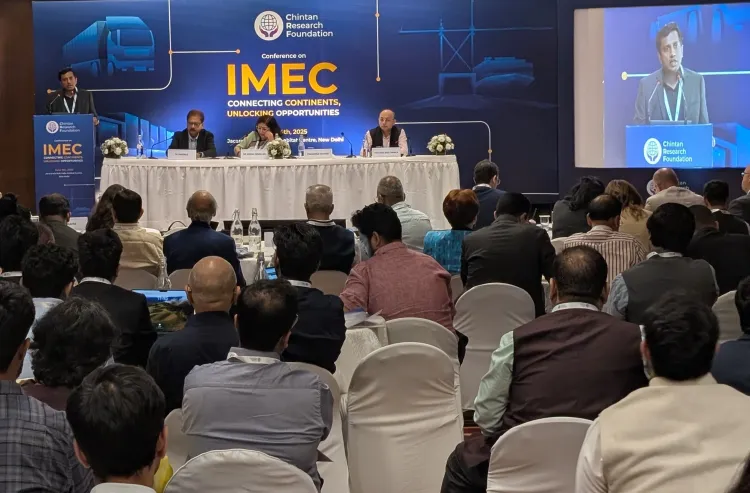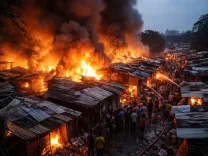How Will IMEC Transform the Global Landscape and Support 'Viksit Bharat 2047' Vision?

Synopsis
Key Takeaways
- IMEC could redefine global trade dynamics.
- Strong partnerships are essential for success.
- Renewable energy is a key focus.
- India aims for energy independence by 2047.
- Investment in infrastructure will drive economic growth.
New Delhi, June 4 (NationPress) The India-Middle East-Europe Economic Corridor (IMEC) is poised to be a transformative force in India's journey toward robust and rapid economic development, as highlighted by leading economic and geopolitical analysts during a conference hosted by the Chintan Research Foundation (CRF). This initiative carries significant implications for India's growth trajectory and aligns with Prime Minister Narendra Modi's vision for a 'Viksit Bharat @2047', aiming to elevate the nation to a developed status by the centennial of its independence in 2047.
The IMEC, a groundbreaking transcontinental connectivity project, was unveiled during the G20 Summit in Delhi in September 2023. It envisions a comprehensive economic corridor linking India to Europe through the Arabian Peninsula, integrating various modes of transport including railways, ports, highways, energy networks, and digital infrastructure to boost trade, investment, and connectivity among continents.
“From a strategic perspective, IMEC is vital for India. With its strong international relations and rapid economic growth, India stands as the cornerstone for this crucial initiative,” stated Dammu Ravi, Economic Relations Secretary in the Ministry of External Affairs (MEA), during his keynote address at the CRF conference titled 'IMEC: Connecting Continents, Unlocking Opportunities'.
The conference gathered experts from government, academia, industry, and private sectors worldwide to deliberate on various facets of IMEC—its potential, promises, challenges, and strategies for implementation.
Despite acknowledging the hurdles in executing a project of this magnitude, with an estimated cost exceeding US$ 600 billion over the next decade, analysts largely concurred that the prospective advantages of IMEC significantly outweigh its challenges.
Once fully operational, IMEC is expected to unveil new avenues for multidimensional trade among regions that have historically maintained close trade relations. It aims to facilitate quicker and more efficient movement of goods, alleviate existing bottlenecks, mitigate shipping delays, decrease greenhouse gas emissions, and lower costs. Additionally, it aspires to secure regional supply chains, enhance trade accessibility, and foster economic prosperity for communities and nations aligned with the project.
“IMEC should be perceived as a balancer between a geopolitical initiative and an economic instrument. Its potential to reshape the global landscape is immense,” remarked Prasanna Karthik, Vice-President (Strategy) at the Adani Group, during the panel discussion, emphasizing the necessity for integrated port development, a vital component for IMEC's success.
With aspirations to achieve energy independence by 2047 and attain Net Zero by 2070, India is intensifying its adoption of renewable energy across all sectors. Green hydrogen is emerging as a promising alternative to facilitate this energy transition.
Earlier, while greeting the delegates, CRF President Shishir Priyadarshi emphasized that a comprehensive approach with robust engagement from private enterprises is crucial for the successful realization of this monumental project.
IMEC presents an avenue for India to not only endorse hydrogen as an alternative energy source but also to export this fuel via clean hydrogen pipelines integrated within the corridor. India has already earmarked US$ 2.5 billion to establish itself as a green hydrogen hub.
Several prominent Indian industrial conglomerates, including the Adani Group, Larsen and Toubro Limited, and ReNew Energy Global, are advancing green hydrogen technology on a significant scale.
Geopolitically, IMEC is also heralded as a manifestation of India’s ascendancy as a global power, both politically and economically, aligning with its emergence as the fourth-largest global economy. It is perceived as a natural progression to strengthen ties between Israel and the West Asian region following the signing of the Abraham Accords in September 2020 and the potential normalization of relations between Saudi Arabia and Israel.
The burgeoning relationships between India and West Asia, along with India and Israel, paired with the promising business opportunities arising from direct connectivity to Europe, further substantiate the importance of IMEC.
In terms of trade relations between the EU and India, IMEC is being regarded as a significant economic catalyst and an opportunity to fortify strategic alliances.
The President of the European Commission, Ursula von der Leyen, during her recent visit to India in March, advocated for IMEC as a pivotal element for enhancing India-EU trade. “This corridor transcends being merely a railway or cable; it serves as a green and digital bridge uniting continents and civilizations,” she emphasized previously.
IMEC was also a key topic during discussions between PM Modi and US President Donald Trump during Modi's visit to Washington in February, with Trump describing it as one of the “greatest trade routes in history” and advocating for an early summit of the eight signatories of IMEC, potentially to occur in India later this year, to initiate work on the project.
In April, ahead of PM Modi's visit to Saudi Arabia, Foreign Secretary Vikram Misri stated that India remains actively engaged with “select partners” on IMEC despite the current political and security climate in the region.
“Although the political and security scenarios may appear to have halted IMEC's progress, India is in dialogue with selected partners and is assessing what actions are necessary. We do not have to await complete stabilization of the security situation to commence work on IMEC,” Misri explained.
IMEC will consist of two distinct corridors: the eastern corridor linking India to the Gulf and the northern corridor connecting the Gulf to Europe.
“Following the framework understanding on IMEC signed in September 2023, all partners faced urgent regional issues that prevented immediate groundwork from beginning. However, this does not imply that the individual countries or groups within the original agreement have not discussed or engaged in outlining the agreement's structure and the work required for progress,” Misri stated on April 19.
Earlier that month, Union Minister of Commerce and Industry Piyush Goyal, while addressing the IMEC High-Level Roundtable on Connectivity and Economic Growth in New Delhi, declared that this visionary concept—an unequivocal endorsement of the leadership and partnership between India, the Middle East, and East Europe—has captured global attention.
Goyal asserted that IMEC is more than a trade route; it represents a modern-day Silk Route—an alliance of equals promoting synergy, connectivity, and inclusive prosperity.
“It is projected to reduce logistics costs by up to 30%, cut transportation time by 40%, and establish seamless trade connections across continents,” he stated. “We are not merely linking trade; we are connecting civilizations and cultures—from Southeast Asia to the Gulf, from the Middle East to Central Europe.”










